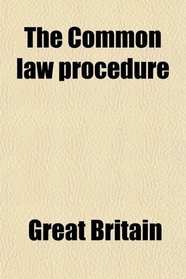Search -
The Common law procedure
The Common law procedure
Author:
Purchase of this book includes free trial access to www.million-books.com where you can read more than a million books for free. This is an OCR edition with typos. Excerpt from book: ceed in the action in such manner and subject to such conditions as to such Court or judge may seem fit, having regard to the time allowed for the defendant to a... more »
Author:
Purchase of this book includes free trial access to www.million-books.com where you can read more than a million books for free. This is an OCR edition with typos. Excerpt from book: ceed in the action in such manner and subject to such conditions as to such Court or judge may seem fit, having regard to the time allowed for the defendant to a... more »
ISBN-13: 9780217580175
ISBN-10: 0217580173
Publication Date: 8/15/2009
Pages: 288
Rating: ?
ISBN-10: 0217580173
Publication Date: 8/15/2009
Pages: 288
Rating: ?
0 stars, based on 0 rating




